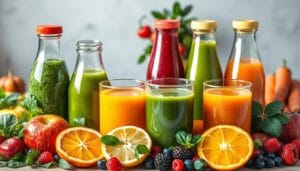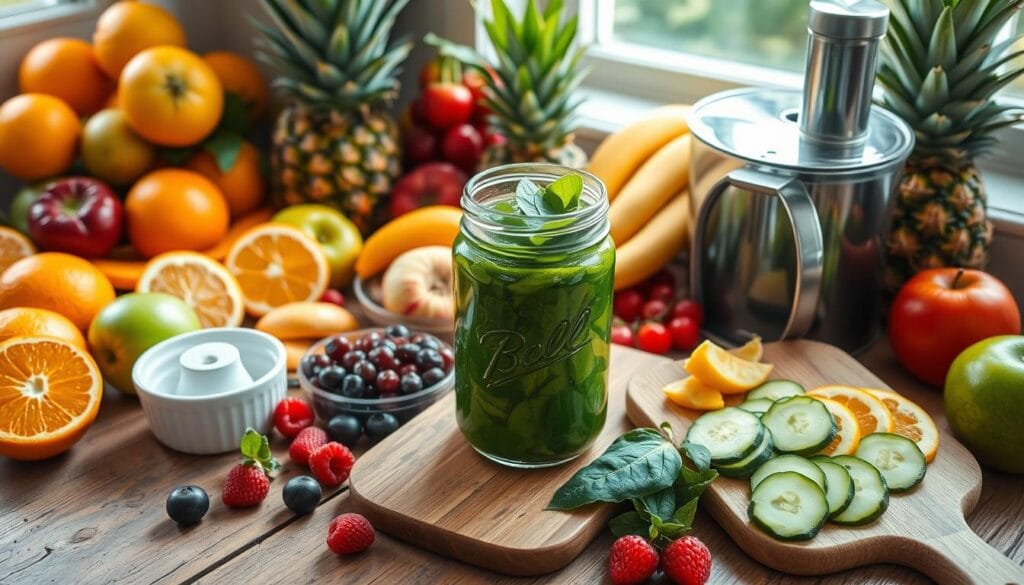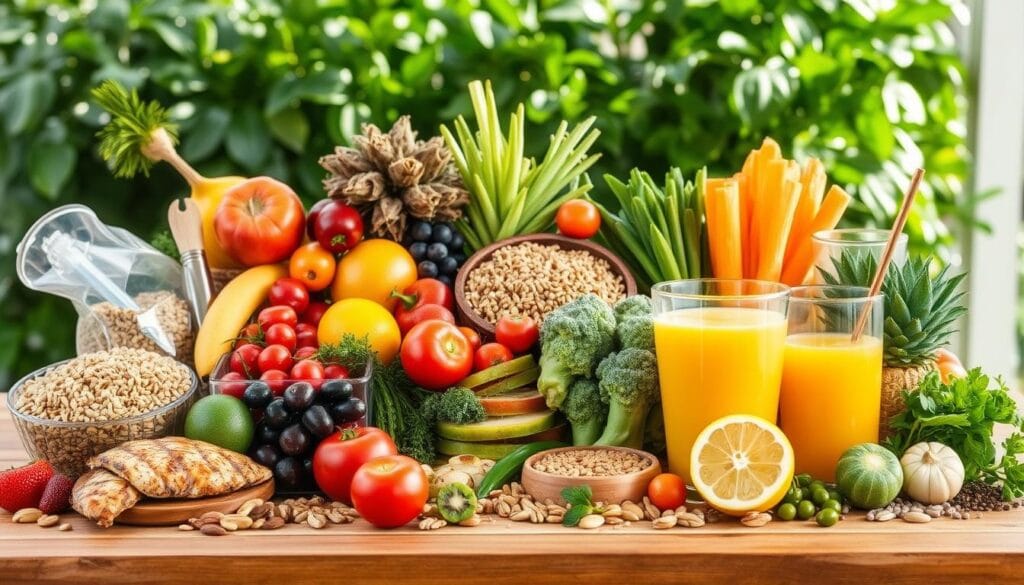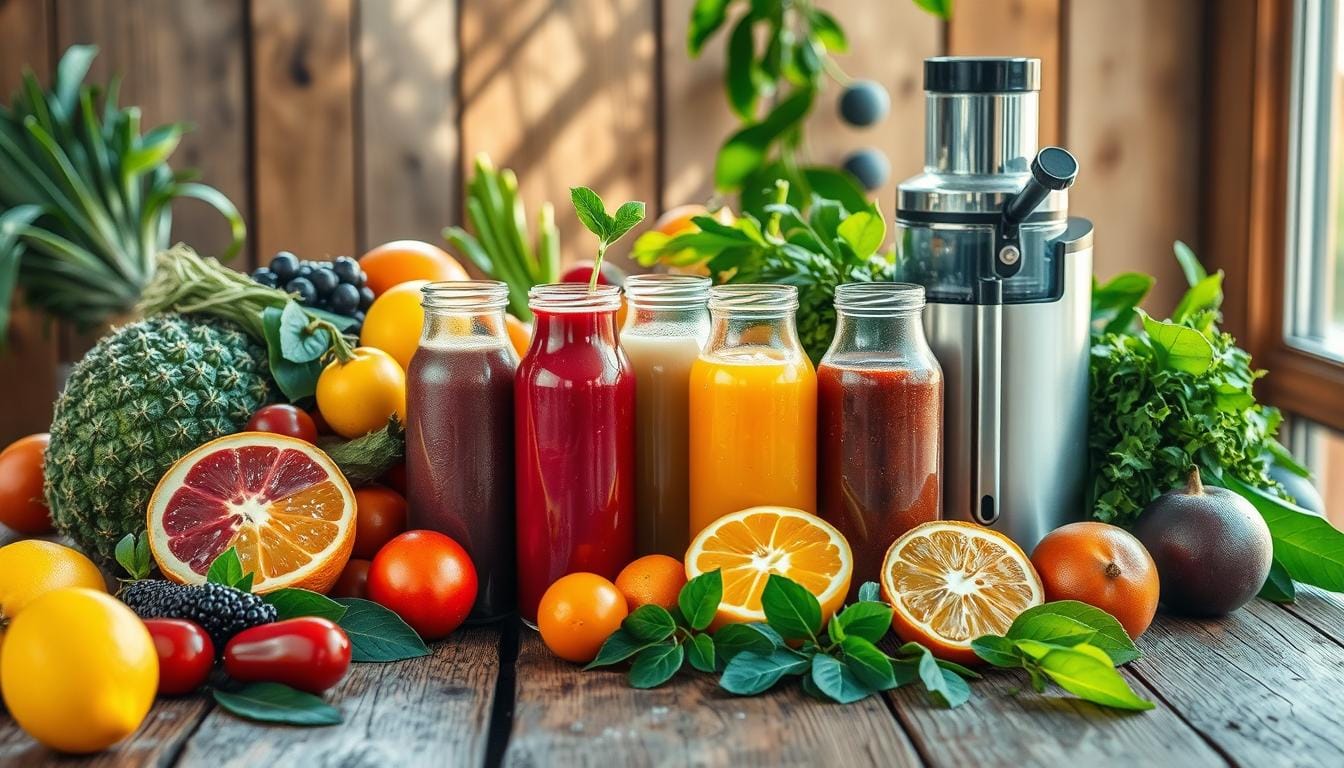Standing in front of the mirror, you’re frustrated with the extra pounds. You’re looking for a healthier way to lose weight. Freshly pressed juices might be the answer. Welcome to your guide on using healthy juicing for weight loss.

You’ll find tasty, low-calorie juicing recipes here. They’re full of vitamins, minerals, and fiber. These juices are a great way to feed your body and control cravings. They also give you more energy. This guide is perfect for anyone looking to lose weight, whether you need a detox or a post-workout boost.
Key Takeaways
- Discover the benefits of nutrient-dense, low-calorie juices for weight loss
- Learn about essential ingredients like leafy greens and low-sugar fruits
- Explore a variety of juicing recipes tailored for weight loss support
- Uncover strategies for incorporating juicing into a balanced diet
- Maximize the benefits of juicing by following expert tips and techniques
The Benefits of Juicing for Weight Loss
Juicing can help with weight loss if done correctly. Nutrient-dense and low in calories, vegetable juices offer key vitamins and minerals. They also support your weight loss journey.
Hydrating and Satiating
Juices are high in water. This helps you feel full and eat less. It’s easier to lose weight this way. Plus, juices keep you hydrated, which is good for your body.
Supports Gut Health and Reduces Cravings
Vegetable juices are nutrient-rich. They can reduce cravings and help your gut health. A healthy gut is linked to better digestion and weight control.
| Benefit | Description |
|---|---|
| Nutrient-Dense and Low in Calories | Juices provide a concentrated source of essential nutrients while being low in calories, making them an ideal choice for weight loss. |
| Hydrating and Satiating | The high water content in juices can promote feelings of fullness and reduce overall calorie intake, aiding weight loss. |
| Supports Gut Health and Reduces Cravings | Vegetable-based juices can satisfy cravings and support a healthy gut microbiome, which is linked to improved digestion and weight management. |
Essential Ingredients for Weight Loss Juices
To make juices for weight loss, choose ingredients that are full of nutrients but low in calories. Leafy greens like spinach, kale, and Swiss chard are great. They are full of vitamins, minerals, and antioxidants. They also help with inflammation, fiber, blood sugar, detox, and heart health.
While veggies should be the main focus, a bit of low-sugar fruit can add sweetness. Fruits like berries, citrus, and green apples are good choices.
Leafy Greens: Nutrient Powerhouses
Adding leafy greens to your juices is a big plus. They are full of vitamins, minerals, and antioxidants. For example, spinach has lots of fiber to keep you full. Kale has anti-inflammatory compounds that help reduce body inflammation.
Low-Sugar Fruits for Flavor Balance
Even though veggies are key, a little low-sugar fruit can make your juice taste better. Berries like blueberries and raspberries are low in sugar but high in fiber and antioxidants. Citrus fruits like grapefruit and lemon add a nice tartness. Green apples add sweetness without raising blood sugar.
Top Vegetable Juicing Recipes for Weight Loss
Adding vegetable juices to your diet can change your weight loss game. They are full of nutrients and low in calories. They also help with digestion, reduce inflammation, and stop cravings. Here are some top vegetable juicing recipes for weight loss.
Green Vegetable Detox Juice
This green juice is packed with antioxidants and nutrients. It mixes celery, cucumber, parsley, and leafy greens like spinach or kale. This detox juice is hydrating and helps the body clean itself. It also reduces inflammation.
Cabbage Juice for Digestive Support
Cabbage juice is great for your digestive health. It might help with bloating and stomach ulcers. This recipe mixes cabbage, apple, and ginger for a tasty flavor.
Anti-Inflammatory Juice with Ginger and Turmeric
This juice fights inflammation with turmeric and ginger. Pineapple adds a refreshing and sweet taste.
Adding these veggie juices to your diet brings many benefits for weight loss. Listen to your body and find the right mix of juices and whole foods for you.
Fruit Juicing Recipes for Weight Loss
For weight loss, focus on veggies first. But, a bit of fruit juices can make drinks sweet and tasty. Choose low-sugar fruits like berries, citrus, and green apples. This way, you get fruit’s sweetness without losing your weight loss aim.
Here are some tasty fruit juicing recipes for your weight loss journey:
- Green Goddess Juice – Kale, spinach, green apple, lemon, ginger
- Berry Blast Juice – Blueberries, raspberries, strawberries, lemon, mint
- Immunity Booster Juice – Carrots, oranges, turmeric, ginger
These fruit juices taste great and help your health. They boost antioxidants, support gut health, and boost your immune system.

Make sure to mix low-sugar fruits with veggies in your juices. This mix helps you lose weight better. Enjoy these fruit juices as part of a healthy lifestyle.
Energy-Boosting Juice Recipes
Juicing is a great way to add energy-boosting nutrients to your day. These juice recipes use root vegetables, natural sweetness, and tartness. They offer a nourishing and refreshing drink.
Carrot-Celery-Ginger Juice
This juice mixes carrots’ earthy sweetness, celery’s crispness, and ginger’s spicy kick. It’s a refreshing drink that boosts your wellness. Carrots and celery support your immune system, while ginger fights fatigue.
Beet-Apple-Lemon Juice
This juice blends beets’ red color and health benefits with apples’ sweetness and lemon’s tang. It’s packed with nutrients and energy. Beets have antioxidants, and lemon boosts iron absorption for more energy.
Detox Juicing Recipes for Weight Loss
Detox juicing can add nutrients to your diet. It helps your body clean itself naturally. Try the Green Vegetable Juice for Cleansing and the Antioxidant-Rich Berry Juice.
Green Vegetable Juice for Cleansing
This green juice is full of antioxidants. It helps your body detox naturally. It has leafy greens, cucumbers, and herbs like parsley and ginger.
Drink 1-2 cups (250-500 mL) a day. It’s good for your body.
Antioxidant-Rich Berry Juice
Berries are full of antioxidants. They help fight free radicals and keep cells healthy. This juice has blueberries, raspberries, and grapefruit. It’s refreshing and good for weight loss.
Adding these juices to your diet can help with weight loss. Start with small amounts. Also, eat well and exercise regularly for best results.
Tips for Incorporating Juicing into Your Weight Loss Journey
Starting a weight loss journey is a big step. Adding juicing to your routine can help a lot. Here are some tips to make it work:
- Establish a Consistent Juicing Routine. Being regular with juicing is important. Pick a time each day to make your juices. It could be in the morning or at lunchtime.
- Meal Preparation Made Easy. Make juicing quicker by prepping ahead. Wash, chop, and store your fruits and veggies. Then, just blend them when you’re ready.
- Minimize Food Waste. Plan well to use all parts of your fruits and veggies. Use scraps in soups or stews. Or, compost them.
Integrating juicing into your daily life can boost your weight loss efforts. A bit of planning and focus can turn juicing into a key part of your journey.
The Role of healthy juicing in a Balanced Diet
Juicing can be great for weight loss, but it’s not a full meal. It’s best to eat whole fruits and vegetables too. Juices add nutrients, but eating a variety of foods is key to getting all you need.
Complementing Whole Foods
Juicing alone may not provide the full spectrum of nutrients, including fiber, that are found in whole foods. To avoid nutrient gaps, use juices as a supplement to a well-rounded diet. This diet should include fruits, veggies, whole grains, and plant-based proteins.
Avoiding Nutrient Gaps
Eating a balanced diet with both juicing and whole foods is best. This way, you get all the vitamins, minerals, and good stuff from foods. Juices help fill in the gaps, making your diet better for your health and weight loss.

Maximizing the Benefits of Juicing for Weight Loss
To get the most out of juicing for weight loss, make sure your juices are full of nutrients but low in calories. Focus on vegetable juices. Stay hydrated and use juicing with a healthy diet for lasting results.
Juicing lets you get lots of nutrients in one drink. Leafy greens like kale and spinach are packed with vitamins and fiber but have few calories. They help you feel full and support your body’s detox.
Drinking enough water is key to juicing’s benefits. Juices from fruits and veggies help you stay hydrated. This is good for your metabolism and overall health. Add ingredients like cucumber and watermelon to your juices.
Remember, juicing is just one part of losing weight. It’s great for nutrients but can’t replace solid foods. Solid foods give you fiber, protein, and healthy fats. Use juicing to boost your diet, not replace it.
| Juicing Benefit | How it Supports Weight Loss |
|---|---|
| Nutrient-Dense | Provides essential vitamins, minerals, and antioxidants with low calorie content |
| Hydrating | Helps keep you hydrated, supporting metabolism and regulating appetite |
| Supports Gut Health | The fiber and enzymes in juices can improve digestion and reduce cravings |
By making nutrient-rich, low-calorie juices and staying hydrated, you can get the most from juicing. It helps with weight loss, nutrition, hydration, and gut health.
Conclusion
Healthy juicing can help with weight loss and better health. Use veggies and a bit of low-sugar fruits in your juices. This boosts hydration, nutrient intake, and cuts cravings.
But, don’t rely only on juicing. It should be part of a balanced diet. Always talk to a doctor to make sure it’s right for you.
Some juicing plans promise quick weight loss and detox. But, they can be dangerous. They might cause dehydration, imbalance of electrolytes, and even eating disorders.
Experts say the best way is to eat healthy all the time. Cut down on sugar, saturated fats, and sodium. This is better than just juicing.
Adding healthy juicing to your life can help with weight loss and health. The recipes and tips in this guide can help you. Just remember to stay balanced, listen to your body, and get advice from a doctor.
FAQ
What are the benefits of juicing for weight loss?
What are the essential ingredients for weight loss juices?
What are some top vegetable juicing recipes for weight loss?
How can I effectively incorporate juicing into a weight loss journey?
What is the role of healthy juicing in a balanced diet?
Source Links
- The 25 best juicing recipes for weight loss – https://www.noom.com/blog/juice-recipes-weight-loss/
- 52 Delicious Juicing Recipes for Weight Loss – Intentionally Eat – https://intentionallyeat.com/weight-loss-printable-juicing-recipes/
- Top 10 Juicing Recipes for Weight Loss – https://naturopress.com.au/blogs/juicing/top-10-juicing-recipes-for-weight-loss?srsltid=AfmBOoqGRdleLErQkKerPt55cWljtkmnXajjYu-_BQAzwgoulTYvZVxr
- Should You Try a Juice Cleanse for Weight Loss? – https://health.clevelandclinic.org/can-juice-cleanses-help-you-lose-weight
- Should You Try a Juice Cleanse? Benefits, Downsides, Safety – https://www.healthline.com/nutrition/juice-cleanse
- Is Your Juice as Healthy as You Think It Is? – https://health.clevelandclinic.org/juicing
- 7 Green Juice Recipes for Weight Loss | LifeMD – https://lifemd.com/learn/7-green-juice-recipes-for-weight-loss
- Calo App – https://calo.app/blog/healthy-juice-recipes
- Top Juicing Recipes for Weight Loss in 2024: Best Ingredients & Methods – https://wp.nyu.edu/kt/2024/09/top-juicing-recipes-for-weight-loss-in-2024-best-ingredients-methods/
- Juicing Recipes for Health and Wellness – https://joyjolt.com/blogs/all_blogs/juicing-recipes-for-health-and-wellness?srsltid=AfmBOorax-Qyk9F4uYQXQwlVOdvzTbD6TYhYhBLroDuJvDY8bK4T42QB
- 50 Healthy Vegetable And Fruit Juices For Weight Loss – https://www.stylecraze.com/articles/healthy-vegetable-juices-for-weight-loss/
- 10+ Best Juice Recipes for Weight Loss – https://www.cleaneatingkitchen.com/juice-recipes-for-weight-loss/
- Top 10 Juicing Recipes for Weight Loss – https://naturopress.com.au/blogs/juicing/top-10-juicing-recipes-for-weight-loss?srsltid=AfmBOopYTpTNJF1InRqCzWzPGz8JJ-2j4x1zdq-MQ4K156FKJuP7_ieW
- Juicing Recipes for Health and Wellness – https://joyjolt.com/blogs/all_blogs/juicing-recipes-for-health-and-wellness?srsltid=AfmBOoovwM3uIsnH3PprakM6cztwkPrQaWtwXjpTId8DRJd7V1ce7clN
- 10 Immunity-Boosting Beverages to Drink When You’re Sick – https://www.healthline.com/health/juice-immune-system-boost
- Juicing Recipes for Health and Wellness – https://joyjolt.com/blogs/all_blogs/juicing-recipes-for-health-and-wellness?srsltid=AfmBOorFt4I6ip4cRJXwQFZq1l5hCl5-vp6RmdgWjy1773RREJBtVq2W
- 7 Juice Recipes for Gut Health & Inflammation – https://www.goodnature.com/recipes/juicing-for-gut-health-inflammation?srsltid=AfmBOoor0_in9uqG5GyUu3KKv_h2kaY5V0S7u0OcKc5kyGlR4JLA6DAi
- Detox Drinks: 15 Delicious Recipes for Weight Loss – https://www.tuasaude.com/en/detox-drinks/
- Top 10 Juicing Recipes for Weight Loss – https://naturopress.com.au/blogs/juicing/top-10-juicing-recipes-for-weight-loss?srsltid=AfmBOopsX0rJodBhQ1uobeHzMhKR0_ijEeYQ7HqSD2SIlbOrV7ncGhGx
- Juicing For Weight Loss – https://www.rawgeneration.com/blogs/ill-start-monday/juicing-for-weight-loss-5-ways-to-do-it-tips-from-a-nutritionist?srsltid=AfmBOopGxpNy_ImnjXI8Mc6CHftTvQb6U8pzxEIQhUICNuKuDXOS7OI7
- Juice Cleanse for Beginners – Jugo USA – https://www.jugousa.com/blog-and-events/how-to-juice-cleanse-for-beginners/
- What Are the Benefits of Juicing? – https://dosedaily.co/blogs/wellness/juicing-benefits?srsltid=AfmBOoobWk6i6IGcYjr9CZnN5pTS63qcQ46hXbV_vueKuQ-SkTFl0ayR
- Is Juicing Healthy? Keep this in Mind When Deciding Between Juice and Whole Foods – Unlocking Insights – Explore Our Articles – https://www.insidetracker.com/a/articles/is-juicing-healthy-benefits
- Juicing For Weight Loss – https://www.rawgeneration.com/blogs/ill-start-monday/juicing-for-weight-loss-5-ways-to-do-it-tips-from-a-nutritionist?srsltid=AfmBOopXiHr8pFzs-hC80c4xjanNnxAwBu2CY9Mf3hTdGRDhKzeNHE2N
- How Semaglutide and Juicing Can Transform Your Weight Loss Journey – Bmi Doctors – https://bmidoctors.com/how-semaglutide-and-juicing-can-transform-your-weight-loss-journey/
- 7 Practical Benefits of Juicing for Your Health – https://www.hurom.com/blogs/reviews/benefits-of-juicing?srsltid=AfmBOorY5ZR4Jzc4wZAg7Tgy8DCgi-lnf0-3MQHuhxW3ArfNfB1luXRX
- Top 7 Tasty Juicing Recipes for Healthy Weight Loss | Season – https://www.seasonhealth.com/blog/juicing-recipes-weight-loss
- You Don’t Need To Try a Juice Cleanse—Here’s Why – https://www.health.com/nutrition/cleanse-dangers
In the era of health-conscious living, many people are turning to juicing as a means to integrate more organic produce into their diets. Juicers have become essential kitchen appliances for those looking to create fresh, nutritious beverages from fruits and vegetables. From vibrant green juices to refreshing citrus blends, the variety of flavors and health benefits are limitless. Each juice offers a way to consume a concentrated dose of vitamins and minerals, making them a go-to choice for quick, healthful nourishment.
However, the allure of a juice cleanse can sometimes overshadow the potential dangers associated with extreme detox diets. While hitting the reset button with a juice cleanse may seem appealing, experts caution against reliance on such methods for long-term weight loss or health benefits. Many people are unaware that juice cleanses can often lead to nutritional deficiencies, as they may deprive the body of essential nutrients found in whole foods. This is why it’s crucial to educate ourselves on the risks and embrace a balanced approach to health rather than chasing fleeting trends.
Instead of committing to a strict cleanse, incorporating juices made with high-quality organic produce into a well-rounded diet is a more sustainable approach. Utilizing both juicers and blenders allows for versatility in dietary habits. While juicers extract the juice from fruits and vegetables, blenders allow for the inclusion of the entire produce item, preserving its fiber content. This means that, rather than discarding the pulp, one can create smoothie bowls packed with nutrients and satiating fiber, promoting long-lasting energy without the side effects of a complete cleanse.
Ultimately, the key to achieving and maintaining a healthy weight lies in balance and moderation. By focusing on integrating fresh juices, whole foods, and mindful eating practices into our everyday routines, we can elevate our nutrition without falling into the trap of extreme dietary fads. The journey to health should never feel restrictive; instead, it can be a vibrant exploration of the diverse and delicious options available to us.


For Healthy food and items with their recipes, visit our website
am gonna take a look thank you
I’m extremely inspired along with your writing skills as well as with
the format for your weblog. Is this a paid subject matter or did you modify it your self?
Either way keep up the nice quality writing, it’s uncommon to
look a great weblog like this one nowadays. Affilionaire.org!
I have been following your blog for a while now and have to say I am always impressed by the quality and depth of your content Keep it up!
Can you be more specific about the content of your article? After reading it, I still have some doubts. Hope you can help me. https://www.binance.info/cs/register?ref=S5H7X3LP
Can you be more specific about the content of your article? After reading it, I still have some doubts. Hope you can help me.
Dưới đây là những sản phẩm mà app 888slot đã và đang cung cấp tại trang chủ chính thức mà bạn có thể lựa chọn trong mỗi lần truy cập. TONY12-26
Nhờ giao diện hiện đại, bảo mật cao, cùng chiến lược toàn cầu hóa thông minh, xn88 casino không chỉ nổi bật mà còn trở thành biểu tượng mới của sự đẳng cấp và an toàn trong ngành cá cược trực tuyến. TONY12-26